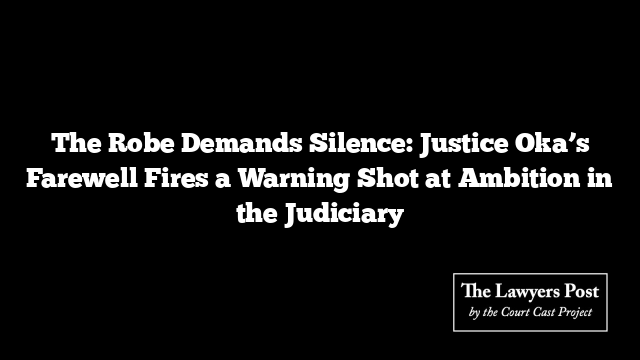At a packed farewell hosted by the Bar Council of Maharashtra and Goa, retired Supreme Court judge Justice Abhay S. Oka took off his robe—but not before delivering one final, unflinching message to India’s judiciary: ambition has no place once the oath is taken.
“If a judge starts thinking about the next chair, he can no longer sit properly in the one he has,” Oka declared, his words slicing through polite applause. “The very instant a judge begins to consider future prospects, the oath is hollowed out. That oath demands detachment. You give your judgment and forget the consequences.”
Justice Oka, who stepped down from the Supreme Court just weeks earlier, was not here to exchange pleasantries. He came bearing a mirror—one that many in the legal fraternity may hesitate to look into.
Throughout his speech, Oka returned to one haunting refrain: the erosion of judicial independence begins not with interference, but with internal compromise. “You cannot calibrate justice. You cannot angle it for approval—whether from governments, opposition, or anyone in between,” he said.
He recalled how during his lectures at judicial academies, he’d remind judges-in-training: “Don’t weigh your ruling against who it pleases or hurts. Don’t try to keep lawyers happy. Don’t hope your verdict fetches a reward. Just give the judgment you believe is right. Then stand by it.”
Justice Oka’s remarks felt like a rebuke to a legal culture increasingly seen as politicised and careerist. He drew a sharp contrast with the past—when judges, he said, had the courage to walk away rather than bend.
He cited the example of Justice Chittatosh Mookerjee, who was offered the Chief Justiceship of India by the Prime Minister on condition that seniority be ignored. Mookerjee’s reply was immediate: “I’ll resign.” Oka nodded. “That’s the kind of memory we must preserve.”
The speech grew heavier as he invoked the fallout of the Kesavananda Bharati judgment—when Justices Shelat, Hegde, and Grover were stripped of seniority for ruling against the government. They all resigned. Then came the example etched in every law student’s conscience: Justice HR Khanna, who predicted the end of his judicial career when he dissented in the ADM Jabalpur case. “We still remember him. And we must. Because that’s the spine of the Constitution.”
But Justice Oka did not only look backward. He delivered a scathing critique of the present state of India’s lower judiciary, calling the shortage of judges “nothing short of a national emergency.” Referring to a 2002 ruling that recommended 50 judges per 10 lakh people, he pointed out that India still languishes at 22.
“It’s not just delay, it’s suffocation,” he warned. “In Allahabad, one judge gets 1,000 bail pleas a day. What should that judge do? What should the parties do? Everyone’s crushed under the numbers.”
He called on bar associations across the country to move beyond criticism and start demanding structural reforms—especially implementation of the judge-to-population ratio.
Justice Oka also turned a spotlight on the toxic delays in appointments to the higher judiciary. Once a lawyer’s name appears in the collegium list, he said, work dries up. “The good ones now say no. They don’t want the agony. We lose them not because they are unwilling, but because we make it too costly to say yes.”
He ended not with a flourish, but a reflection on restraint: how even after retirement, he remains cautious about media interviews. “The robe may be gone, but the silence remains,” he said. “Even without the title of Justice, I must carry its discipline.”
There were no soaring exits, no self-congratulations. Just a courtroom veteran closing the door quietly—after making sure everyone heard what was at stake.





